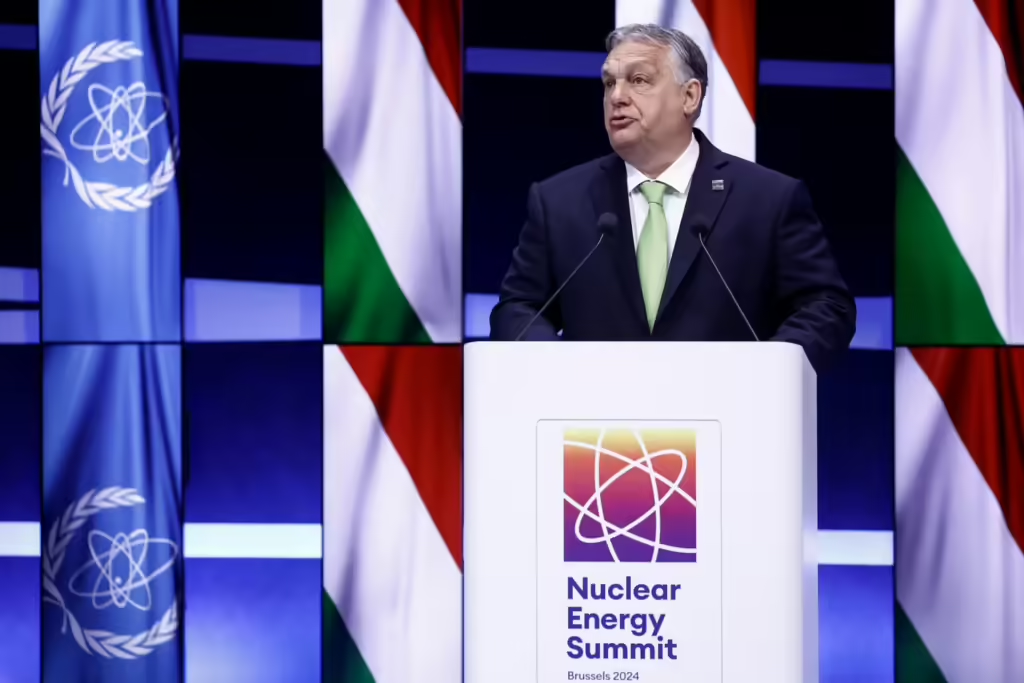There’s a big obstacle, though: Viktor Orbán.
There’s renewed European Union momentum to kick Russia’s nuclear sector out of the bloc and strip Moscow of one of its remaining holds over Europe’s energy supplies — if Viktor Orbán will allow it.
In Brussels, the European Commission, the EU’s executive, has pledged to explore whether the EU should sever ties with Russia’s “full nuclear supply chain” as part of a broader plan to eradicate energy dependency on Moscow.
And across the EU’s more hawkish capitals, officials are agitating to include nuclear restrictions in Brussels’ next Russia sanctions package, the 15th so far, expected to move forward early next year.
Together, it marks a revitalized effort to target Russia’s nuclear revenues, which have continued to benefit from European business throughout Moscow’s war in Ukraine.
Yet one factor remains unchanged: Viktor Orbán. The Hungarian leader has unyieldingly vowed to block any steps to restrict Russia’s civilian atomic energy industry. And he has consistently defended Hungary’s decision to expand a Russian-made nuclear power station near the town of Paks with the help of Moscow’s state-run atomic firm Rosatom.
“We will not allow the plan to include nuclear energy into the sanctions to be implemented,” Prime Minister Viktor Orbán said last year when the prospect of restrictions on Russia’s nuclear sector was first raised. “This is out of the question.”
Given that, several EU countries are now exploring creative ways to find a compromise that could allow nuclear restrictions into an upcoming sanctions package against Russia, according to two EU diplomats, who were granted anonymity to speak candidly about the sensitive matter.
Possibilities include locking Moscow out of future nuclear projects and barring it from the development of next-generation, small-scale nuclear reactors, which the EU is championing, the diplomats said.
“It’s clear that we need targeted restrictions on Russian nuclear, but this has proven controversial for Hungary because of their Paks power plant,” said one EU diplomat with knowledge of the talks, granted anonymity to speak freely.
“Some [EU] member states are considering banning Russian involvement in future projects to phase this out,” the envoy said. “They expect assurances that Russia’s nuclear sector will be locked out of future technologies like small modular reactors.”
The worry is that the Kremlin will regain energy leverage over Europe just as the continent sheds Russian fossil fuels.
“Assurances are needed for the sake of Europe’s strength,” the diplomat said. “Russia is pooling efforts to become an indispensable part of the nuclear sector, too, as they did before with oil and gas.”
Still, even the compromises under discussion are unlikely to get past Orbán, according to Péter Krekó, executive director at the independent Budapest-based Political Capital think tank, unless Hungary gets a specific exemption.
That’s because Budapest has signaled it is open to future cooperation with Russia on nuclear projects including small modular reactors (SMRs), he said. Orbán could also use his veto power to extract further concessions from Moscow.
“He can go to Moscow and say that we have saved your interests,” Krekó said.
In Brussels, Orbán would rely on a different argument, he predicted, insisting restrictions on Russian nuclear power would drive up EU energy bills; with SMRs, the Hungarian premier may argue sanctions could hamper the technology’s development in Europe, Krekó added.
And that would partly be true, according to Sylvain Cognet-Dauphin, an executive director at S&P Global and a nuclear expert, since some types of SMRs rely on uranium that’s more highly enriched than standard fuel — so-called HALEU.
“As of today only Russia and China have HALEU production,” he said. The United States and United Kingdom are currently looking at producing the same type of fuel, but those likely won’t be ready until the next decade.
Yet unlike Budapest, most EU member countries have already started to shun the Russian nuclear sector, including a number of Eastern European nations that still operate Soviet-designed power stations.

In March, Bulgaria announced it would buy American-made fuel rods for the first time to load into its fleet of VVER reactors, built in partnership with the USSR in the 1970s.
U.S. firm Westinghouse has been developing fuel products that are compatible with the aging technology, while French atomic energy giant EDF is looking to play a role in the construction of new sites from the Czech Republic to Kazakhstan.
Meanwhile, Finland — which operates five reactors — moved to scrap a €7 billion joint venture with Rosatom to construct a new power plant at Hanhikivi just weeks after the start of Russia’s full-scale invasion of Ukraine.
Rosatom is litigating the decision, which it insists is unlawful and “politically motivated.” The introduction of bloc-wide sanctions on future projects, however, could give governments locked into contracts grounds to exit them without paying damages.
Source: Politico


